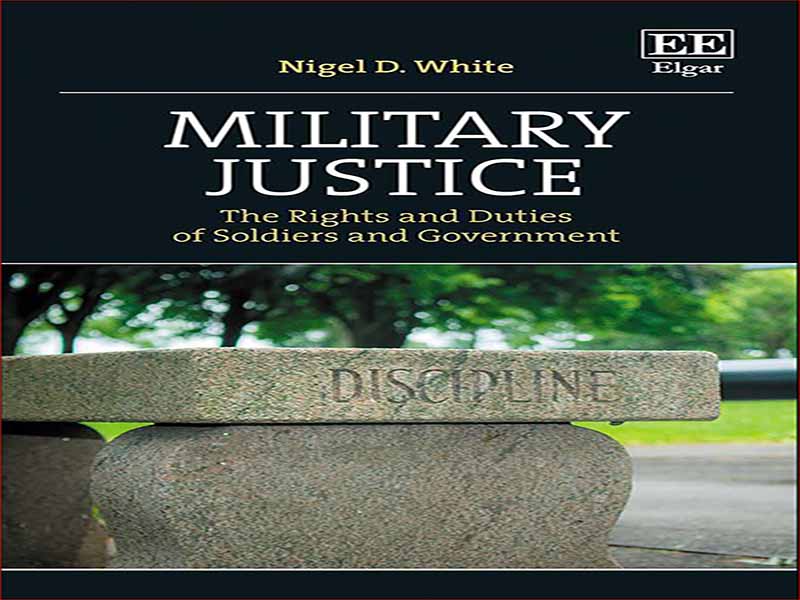- عنوان کتاب: Military Justice – The Rights and Duties of Soldiers and Government
- نویسنده: Nigel D. White
- حوزه: پلیس
- سال انتشار: 2022
- تعداد صفحه: 387
- زبان اصلی: انگلیسی
- نوع فایل: pdf
- حجم فایل: 1.31 مگابایت
مسائل مربوط به عدالت نظامی در گفتمان عمومی نفوذ می کند. آنها از مسائل مربوط به مسئولیت کیفری ناشی از میراث استقرار نظامی داخلی و خارجی در ایرلند شمالی، افغانستان و عراق تا مسائل گسترده تر در مورد میزان اعمال قوانین حقوق بشر در عملیات نظامی را شامل می شود. در حالی که مسئولیت کیفری اصولاً مربوط به نقض وظایف سربازان بر اساس قانون خدمت و قانون درگیری مسلحانه است، اعمال قانون حقوق بشر شامل وظایف دولت هم در قبال غیرنظامیان گرفتار در عملیات نظامی و هم در قبال سربازان درگیر است. قانون نقش اصلی را در چارچوب فعالیت های ارتش ایفا می کند، اما بحث های داغ و گاه تلخی در مورد ماهیت و گستره قانون قابل اجرا وجود دارد. این موارد در موضوعات قانون اساسی، از جمله قدرت دولت برای دستور اعزام سربازان به جنگ های بحث برانگیز و وظایف سربازان برای اطاعت از این دستورات، تا اعمال قانون درگیری های مسلحانه مانند قدرت ارتش برای بازداشت غیرنظامیان را شامل می شود. در درگیری های مسلحانه و وظایف سربازان در قبال بازداشت شدگان. همه مسائل مربوط به پاسخگویی را هنگامی که کارها اشتباه پیش میرود، مطرح میکنند، که ممکن است به شکل تحقیقات عمومی یا پرس و جو توسط کمیتههای منتخب یا منجر به محاکمه نظامی سربازان دخیل در سوء استفاده از بازداشتشدگان شود. در حالی که قانون ارتش یا خدمت اغلب به عنوان قوانین، فرآیندها و نهادهای خاص و تخصصی حاکم بر پرسنل خدماتی به طور محدود درک و مطالعه می شود، این کتاب رویکرد گسترده تری دارد و عدالت نظامی را از در نظر گرفتن گسترده تر حقوق و وظایف دولت در عملیات نظامی و … بررسی می کند. وظایف و حقوق سربازان درگیر در چنین مواردی. علاوه بر این، با بررسی رابطه بین ارتش و جامعه می توان به درک عمیق تری از منطق عدالت نظامی دست یافت و هم برای تداوم آن و هم برای هر گونه اصلاحی در آن ادعا کرد. ارتش اغلب به عنوان یک جامعه جداگانه در نظر گرفته می شود که توسط قوانین جداگانه اداره می شود. این کتاب نشان میدهد که این قطعاً از نظر تاریخی درست بوده است و تا حدی همینطور باقی میماند، به عنوان مثال در مورد تعقیب جرائم انضباطی مانند فرار از خدمت در دادگاه نظامی. با این حال، درک بحث های مداوم در مورد نیاز به یک سیستم عدالت نظامی و نیاز به تغییر آن به منظور بازتاب تغییرات اجتماعی گسترده تر، بدون کاوش در جایگاه ارتش در جامعه و شناخت تأثیرات گسترده تر آن ممکن نیست. عدالت و قانون بر آن است. به عنوان مثال، دادگاه نظامی، که محور عدالت نظامی است، در طول سال ها به شدت تغییر کرده است و همچنان تغییر خواهد کرد تا این موضوعات گسترده تر حقوق و عدالت را منعکس کند. به طور گستردهتر، با در نظر گرفتن ارتباط رژیمهای حقوقی، که به دلیل تغییر درک در قوانین و موقعیتهای متفاوتی که ارتش در آن مستقر شدهاست، از نظر کاربرد، فروکش میکند، این کتاب نشان میدهد که عدالت نظامی هم پیچیده است و هم در وضعیتی از شار این که آیا این اتهام را توجیه می کند که ارتش به طور فزاینده ای در معرض «قانون» قرار دارد، به این معنی که ارتش اکنون آنقدر گرفتار قوانین و مقررات است که دیگر نمی تواند به طور مؤثر عمل کند، یکی از موضوعات عدالت است که در این کتاب مورد بحث قرار می گیرد.
Issues of military justice permeate public discourse. They range from questions of criminal responsibility arising out of the legacy of internal and external military deployments to Northern Ireland, Afghanistan and Iraq, to wider issues of the extent of the application of human rights law to military operations. While criminal responsibility principally concerns breach of duties owed by soldiers under service law and the law of armed conflict, the application of human rights law involves the duties of the government to both civilians caught up in military operations and to the soldiers involved. Law plays a central role in framing the activities of the military, but there are heated and sometimes bitter debates about the nature and extent of the applicable law. These range across constitutional matters, including the power of the government to order the deployment of soldiers to controversial wars and the duties of soldiers to obey such orders, to the application of the law of armed conflict such as the power of the military to detain civilians in armed conflict and the duties of soldiers towards detainees. All raise matters of accountability when things go wrong, which may take the form of public inquiries or inquiries by Select Committees or lead to the court martial of soldiers involved in the abuse of detainees. While military or service law is often narrowly understood and studied as the specific and specialist laws, processes and institutions governing service personnel, this book takes a broader approach and examines military justice from a wider consideration of the rights and duties of government in military operations and the duties and rights of soldiers engaged in such. Moreover, by exploring the relationship between the military and society it is possible to reach a more profound understanding of the rationale for military justice and make the case for both its continuation and for any reforms to it. The military is often viewed as a separate society governed by separate laws. This book demonstrates that this has certainly been true historically and in part remains so, for example when considering the prosecution of disciplinary offences such as desertion before a court martial. However, it is not possible to understand the continuing debates about both the need for a system of military justice, and the need for it to change to reflect wider societal changes, without exploring the place of the military in society and recognising the wider influences of justice and law upon it. For example, the court martial, which is the centrepiece of military justice, has changed dramatically over the years and will continue to change to reflect these wider issues of law and justice. More broadly, by considering the relevance of legal regimes, which ebb and flow in terms of applicability because of changing understandings in the law and the differing situations the military is deployed to, the book shows that military justice is both complex and in a state of flux. Whether this justifies the accusation that the military is increasingly exposed to ‘lawfare’, meaning that the military is now so bogged down with laws and regulations that it can no longer operate effectively, is one of the issues of justice discussed in this book.
این کتاب را میتوانید از لینک زیر بصورت رایگان دانلود کنید:
Download: Military Justice




































نظرات کاربران